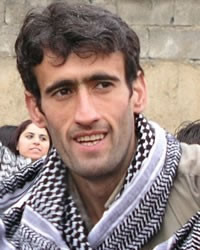Kurd, Kurmanji in Syria

Photo Source:
manothegreek
|
Send Joshua Project a map of this people group.
|
| People Name: | Kurd, Kurmanji |
| Country: | Syria |
| 10/40 Window: | Yes |
| Population: | 1,746,000 |
| World Population: | 16,544,400 |
| Primary Language: | Kurdish, Northern |
| Primary Religion: | Islam |
| Christian Adherents: | 0.13 % |
| Evangelicals: | 0.06 % |
| Scripture: | Complete Bible |
| Ministry Resources: | Yes |
| Jesus Film: | Yes |
| Audio Recordings: | Yes |
| People Cluster: | Kurd |
| Affinity Bloc: | Persian-Median |
| Progress Level: |
|
Introduction / History
Kurds represent almost ten per cent of the population of Syria and five percent of the world population of Kurds. They live in three main regions of northern Syria which, though politically an integral part of the country, are ethnically and linguistically connected to Kurdistan.
The country's largest Kurdish population lives just east of the Euphrates River. This piece of land is more than 175 miles long and stretches across the northern section of the Iraqi border. This region was settled by Kurdish tribes and other mountain peasants who were fleeing Turkish persecution. They eventually became permanent settlers there. There are also substantial Kurdish communities in the cities of Aleppo and Damascus further south. Syrian Kurds who speak Arabic as their first language are classified as Arabs by the Syrian government. In 1962 the new Syrian government stripped many Kurds of citizenship that was previously granted during the French Mandate of Syria.
Syrian Kurds speak Arabic as well as their own language of Kurmanji or northern Kurdish. Educated Kurds speak English and often French. A complete Kurmanji Bible became available in 2008.
What Are Their Lives Like?
The Syrian Civil War has been raging since 2011 with no sign of ending. The lives of the Kurds in Syria have been disrupted. Many Kurds have died in the violence and many others have been displaced. The Kurds have been able to carve out a semi-autonomous region in northeastern Syria as their own territory. This region has been attacked by Turkish forces in recent years. Turks view Kurdish leaders and parties as terrorists.
The Kurd-Dagh, or "mountain of the Kurds," is located in the extreme northwestern part of Syria. This is also the westernmost part of Kurdistan and the only populated mountain area in Syria. Grains, vines, figs, olives, and mulberries grow there. In higher altitudes, there are oak forests. To supplement their agriculture, Kurds raise sheep, goats and cattle.
The father is the head of the Kurdish home. In traditional Kurdish society the wife stays at home to take care of the children. As more women are educated, more of them are taking jobs outside the home. Most men marry one wife although a wealthy man may have as many as four wives. Children, especially boys, are seen as the blessing of Allah.
What Are Their Beliefs?
Nearly all Kurds are Muslims, most being Sunnis. A tiny fraction claim to be followers of Jesus Christ. Kurds first embraced Islam after the Arab conquests of the seventh century. Today, they look to Islam as a basis for social justice. Sunnis try to obey the teachings of the Koran and the prophet Mohammad. Sunnis believe that by following the Five Pillars of Islam that they will attain heaven when they die. However, Allah, the supreme God of the universe, determines who enters paradise. Sunnis pray five times a day facing Mecca. They fast the month of Ramadan. They attend mosque services on Friday. If a Muslim has the means, he or she will make a pilgrimage to Mecca once in his or her lifetime. Muslims are also prohibited from drinking alcohol, eating pork, gambling, stealing, using deceit, slandering, and making idols.
The two main holidays for Sunni Muslims are Eid al Fitr, the breaking of the monthly fast and Eid al Adha, the celebration of Abraham's willingness to sacrifice his son to Allah. The most important festival for the Kurds is Newroz or the New Year's celebration starting on March 19-21. Kurds eat special meals, dance, sing, wear holiday clothing, and jump over bonfires. The Syrian government has tried to suppress the celebration of this Kurdish holiday.
What Are Their Needs?
Throughout most of their history, the Kurds have not had a country to call their own. Neither have they been free to express their own culture. They have been persecuted and displaced throughout their past. The Kurds need to know the peace, love, and security that can only be found through a relationship with Jesus Christ. Christian agencies can provide relief for Kurdish refugees and gain a platform to share the good news.
Prayer Points
Pray that God will supply clean water and food for the Kurmanji Kurds living in refugee camps.
Ask the Lord to raise up Christian medical teams who can take supplies and expertise to the Kurmanji Kurds.
Ask the Lord to call Holy Spirit anointed Syrian believers to share Christ with Kurmanji Kurds.
Ask God to encourage and protect the small number of Kurdish believers.
Ask the Holy Spirit to soften Kurdish hearts towards Christ and be willing to become part of a movement to the Savior.